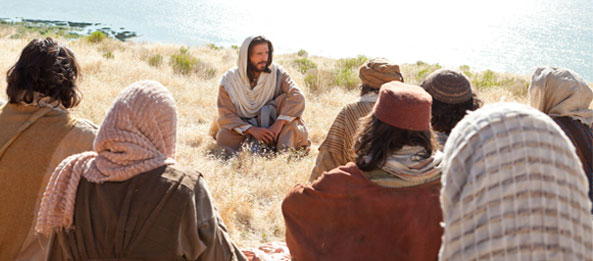Licence vs Legalism
“Yes! A piano; at last!” gasped James staring at the black and white keys in front of him. His dream had come true; he would now be the pianist he had always wanted to be. His father had been true to his word when he said that if James did well in his exams he would buy a piano for his 13th birthday. Now James sat at the piano imagining the melodies that would be played, the songs that would be written, even the fame that could be his. As he sat there, he glanced momentarily at his dad as if to say “Watch this” and then went for it. His fingers plunged into the keys, and ran up and down with increasing volume as his confidence grew and grew. Finally he stopped, looked up at his dad, and said, “So what do you think?” His dad was staring in disbelief, “James! Sorry, but that was terrible! You need lessons son; you need to know how. That was not music!”
Freedom of a piano does not give us the ability to produce music. We are only free to produce music when we have mastered the piano. This is true of much of life; we often think we are free when we are first given the car-keys, or first allowed to date, or first allowed to drink, or first given a pay cheque. But having the freedom to a car, or to date, or to beer, or to money, can be dangerous if we have not been taught how to handle those things in a healthy way, and a way that brings music to our Heavenly Father’s ears. Today we are discussing the balance between license and legalism; freedom and restraint.
Jesus practiced more freedom than the religious leaders of his day. He ate and drank with ‘sinners,’ spoke to women alone, and did the work of a doctor on the Sabbath; all of which were taboo in religious circles. By comparison, John the Baptist practiced less freedom than the religious leaders. He did not eat fancy food, did not drink wine, and lived in the desert where he was cut off from moral pollution.
In Matthew 11.18-19 Jesus drew a strong contrast between himself and John; “John came neither eating nor drinking, and they say, ‘He has a demon.’ The Son of Man came eating and drinking, and they say, ‘Here is a glutton and a drunkard, a friend of tax collectors and sinners.’” The Pharisees considered John a demoniac because of his austere and reclusive life, and Jesus a drunkard and glutton because of his extremely social life. John modelled separation from the world while he preached repentance, and Jesus modelled the need to be in the world while he preached being salt and light.
The apostle Paul brought both these models together. He sometimes attacked legalism while preaching freedom, and at other times attacked licence while preaching restraint. In Galatians 5:1-3 Paul frustrated and angry as he condemns the re-immerging legalism. He says, “It is for freedom that Christ has set us free. Stand firm, then, and do not let yourselves be burdened again by a yoke of slavery. Mark my words! I Paul, tell you that if you let yourselves be circumcised, Christ will be of no value to you at all. Again I declare to every man who lets himself be circumcised that he is obligated to obey the whole law.” Jewish believers had come from Jerusalem and were telling the Galatian church to be circumcised. Paul would probably have taken a softer approach if the Galatians were at home with Jewish laws, but they were gentiles. Paul warns them that to embrace circumcision is to embrace the entire Jewish law, which includes the observance of clean and unclean foods, plates and cups. This would cause a big problem. Gentile food, plates and cups were considered unclean. Galatians observing these laws would be unable to eat their families and friends; they would be cut off from their community. It was an unnecessary barrier to the gospel.
This type of problem still exists today. Imagine if you were raised in a conservative Christian community and you were taught that alcohol was forbidden. Your family believes it, your church believes it, and your close friends believe it. But a new branch of your church has just started in a more secular part of the city where people were not raised as believers. This church is full of new converts who have attended bars as long as they can remember, and all their friends do to. They’re not the kind that drink to get drunk, but do have a social drink or two with friends on the way home from work. To impose a ‘no alcohol’ rule on these new believers would be the same as imposing a ‘no unclean food’ rule on the Galatians, and it would cut them off from their circle of friends; the very people they should be leading to Christ.
But Paul didn’t just attack legalism, he attacked licence too. In 1 Corinthians 8.1-13 Paul says, “Now about food sacrificed to idols…We know that an idol is nothing…and there is no God but one…But not everyone knows this. Some people are still so accustomed to idols that when they eat such food they think of it as having been sacrificed to an idol…their conscience is weak…Be careful…that the exercise of your freedom does not become a stumbling block to the weak. For if anyone with a weak conscience sees you who have this knowledge eating in an idol’s temple, won’t he be emboldened to eat what has been sacrificed to idols? So this weak brother…is destroyed by your knowledge.”
The situation into which Paul was speaking is this: Everyone in Corinth was invited to participate in the feasts of the Isthmian Games. These took place the year before and after the Olympic Games. It was a normal part of Corinthian life and something the community looked forward to. The Christians in Corinth wanted to join in the celebrations along with their families and friends, but the feasts were held in temples and the food was meat that had been sacrificed to idols. The Corinthian Christians wanted to know if it was wrong to attend the celebrations and eat the food?
Paul said it was fine to attend and eat the food because the idols were not real gods so the sacrificed meat was just ordinary meat. But he cautioned them to be careful of what new believers without this knowledge might think. If someone without this knowledge saw their mentors eating meat offered to idols, they might think their mentors were not serious about Christ, or that it’s ok to believe in Christ alongside other gods.
You can imagine this happening today. If you were raised in a Hindu community and converted to Christ you may not want to sever relationships by missing out on Hindu celebrations at the temple. But other less informed converts who see you going to the temple may assume you are just embracing Christ as another Hindu god.
Paul says we must not destroy our brother with the knowledge we have. Rather we should act in love. And if missing the Isthmian Games or Hindu celebrations is going to help others in their faith, then we should do that. So Paul taught us that we are free, but we must be careful that the exercise of our freedom does not become a ‘stumbling block’ to others.
But now let me ask you a big question. If eating in a temple could cause someone to stumble why did Jesus drink with tax-collectors and ‘sinners’, and why did he allow a sinful woman to kiss his feet, and why did he have a lonely chat with a Samaritan woman? Couldn’t these things be taken wrongly? Well…they were! Jesus was called a drunkard because he had a few cups with Levi and the boys, and Simon the Pharisee thought there was no way Jesus could be a man of God while this woman was kissing his feet, and his disciples didn’t ask what he wanted with the Samaritan woman, but they certainly did wonder. Isn’t this what being a stumbling block is all about?
Well have you ever wondered what the situation might look like from the other side? What if you were one of the tax-collectors, or that sinful woman, or the Samaritan woman? These people assumed they were too bad for God to have any interest in them. They were certain of this because the religious leaders wouldn’t come near them. But the religious leaders were giving them the wrong signals; God was interested in them, but he could not find a religious leader who would befriend them and show his love and care. According to scripture, Jesus’ drinking with ‘sinners’ and his interactions with odd women were not the stumbling blocks. The real stumbling blocks were the rules of the religious leaders. These rules stopped the gospel from getting to those who needed it most.
I have done a lot of outreach in bars and I have seen this first hand. Most people in bars either think they are too bad for God to care about them, or they think that becoming a Christian means giving up on your bar friends, and spending the rest of your life in church discussing the Bible. This is when I like to surprise them and say, “Well, I’m drinking with you in a bar, and we have just talked for 20 minutes about football, and I’m a genuine Christian, does that make you feel better?” And that’s normally when bar people start asking lots of questions like, “Wow, so what church do you go too? Can we come? What do you believe about life after death? Do you really believe Jesus was the Son of God?” And suddenly all the doors fly open and the gospel is shared. I can imagine this happening with Jesus again and again because he was the ‘friend of tax collectors and sinners.’
In Luke 5.29-32 it says “Then Levi held a great banquet for Jesus at his house, and a large crowd of tax collectors and others were eating with them. But the Pharisees and the teachers of the law who belonged to their sect complained to his disciples, “Why do you eat and drink with tax collectors and ‘sinners’?” Jesus answered them, “It is not the healthy who need a doctor, but the sick. I have not come to call the righteous, but sinners to repentance.”
Now imagine what would have happened if Jesus had decided he wouldn’t drink with ‘sinners’ or talk to women just in case he was a stumbling block. We would never have heard of Levi, the sinful woman, or the Samaritan women. They and all connected with them would have remained lost and the belief that God did not care about ‘sinners’ would have prevailed. Sometimes when we try to avoid being a stumbling block to a few stiff religious folk in our church, we are being a bigger stumbling block to the multitudes of ‘sinners’ outside it. I think this was the reason for our Lord’s actions, and we need to learn from it.
So what is the correct balance between license and legalism? I think it is modelled in the life of Jesus and explained in the teachings of Paul. We should always do what is loving and what brings glory to God. This cannot be done by indiscriminately imposing the same rule in every situation; we have to re-evaluate ‘What would Jesus do’ every time we are presented with a new challenge. Doing what is right includes checking our motives – Jesus had pure reasons for eating and drinking with tax collectors and talking to rejected women. It also includes being certain that our actions will not cause us to sin. And, as far as possible, that they will not cause others to stumble. I say ‘as far as possible’ because, as with Jesus and John, some people will think the wrong things about you no matter what you do.
Paul sums up the balance between license and legalism in a number of brief sentences: “So whether you eat or drink or whatever you do, do it all for the glory of God” (1 Co 10.31), “Do not use your freedom to indulge the sinful nature” (Gal 5.13), “If you are led by the Spirit, you are not under law” (Gal 5.18), “Why should my freedom be judged by another’s conscience?” (1 Co 10.29), “Nobody should seek his own good, but the good of others” (1 Co 10.24), “Everything is permissible – but not everything is beneficial” (1 Co 10.23).
The last one brings us back to our piano playing illustration. It’s one thing to have the permission to play, it’s another thing to play in a way that is beneficial – brings life to all around us, and is music to our Father’s ears. As believers we are called to be ‘In the world, but not of the world.’ Sometimes there is the need to withdraw from the world for a period like John, but our ultimate aim is to be strong in the world like Jesus. When Jesus ate and drank with ‘sinners’ he took his disciples with him and they learnt what it was to be light in the dark. By the knowledge of scripture, the law of love, and the leading of the Spirit, let us glorify God and benefit all by doing what Jesus did.







